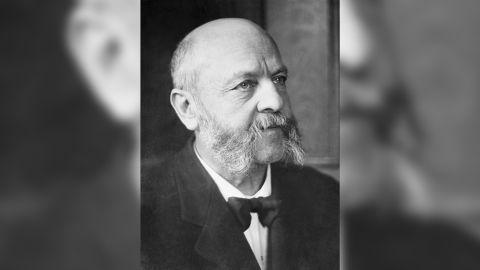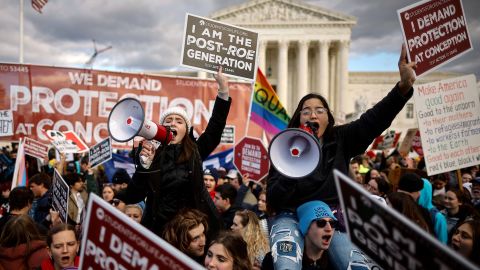
This law from the 1870s could imperil abortion in blue states

– Source: CNN ” data-uri=”archive.cms.cnn.com/_components/video-resource/instances/h_faa81c710324bd6da60fe3a1f75aa456-h_a6a66c7139e5987248efd001a66514aa@published” data-video-id=”us/2023/01/22/after-roe-v-wade-living-wills-tiktok-cntd-orig-jc.cnn” data-vr-video=””>


50 years after Roe, pregnant women are posting their last wishes on TikTok
01:26 – Source: CNN
Editor’s Note: Mary Ziegler (@maryrziegler) is is the Martin Luther King Professor of Law at UC Davis. She is the author of “Dollars for Life: The Antiabortion Movement and the Fall of the Republican Establishment” and the forthcoming book, “Roe: The History of a National Obsession.” The views expressed in this commentary are her own. Read more opinion articles on CNN.
CNN —
Since the Supreme Court reversed Roe v. Wade in June, promising strategies have emerged to protect abortion rights in individual states. Some have begun to pass ballot initiatives to preserve or create state constitutional protection. Others have looked to legislatures to shield doctors and those who help people seeking abortion from potential consequences in conservative states.

These wins are hardly a silver bullet: not all states allow ballot initiatives and there are any number of states where majorities of voters seem to support abortion rights but are governed by legislators who want to ban the procedure—a result of deep partisan divides, gerrymandering and limits on access to the vote.
Just the same, supporters of abortion rights have made the most of the best strategies available to them, bolstered by the fact that most Americans support at least some access to legal abortion.
This is, in part, why antiabortion groups have gotten creative and developed new strategies to cut off access to abortion, even in states where voting majorities have already chosen to guarantee it. An obvious target is abortion pills, which now account for more than half the procedures in the United States.
But the latest approach by abortion opponents to disrupt access in blue states is an archaic law: the Comstock Act, passed in 1873 mainly to target what Anthony Comstock, an anti-vice crusader, viewed as dirty books. Comstock, who was made a special agent of the US Postal Service, was obsessed by what he saw as the decaying morals of a country preoccupied with sex.
The law he inspired barred not just the mailing of “obscene books” but also birth control and abortion drugs and devices. In the 19th and early 20th centuries, the Comstock Act was used to prohibit the mailing of many literary classics, from Geoffrey Chaucer’s “The Canterbury Tales” to works by James Joyce and Walt Whitman.
Comstock himself proudly carried a gun and scoured the mail for cases involving information about abortion or contraception, even if a doctor provided it. By Comstock’s standard, the law was a great success: he claimed to have destroyed 15 tons of books, arrested more than 4,000 people and driven at least 15 people to suicide.

But by the time Comstock died in 1915, Americans were having second thoughts about his crusade and courts started to limit the application of the law. Judges suggested that there were lawful uses of some drugs, like contraceptives, and that the Comstock Act applied only to those who intended to violate the law. That meant that doctors validly prescribing certain medications might be exempt from the Comstock Act, as would patients acting under a physician’s advice.
Some members of the antiabortion movement are pushing for a comeback for the Comstock Act, fighting for local ordinances that assert an obligation to follow federal law, including the Comstock Act.
The Alliance Defending Freedom (ADF), a socially conservative group, has filed a lawsuit in Texas that hinges on application of Comstock’s law. These groups suggest that the Comstock Act applies far more broadly—to the mailing of any abortion pill, to anyone, anywhere. They question the interpretation of the law offered by courts since the 1910s—and stress that this interpretation only ever applied to birth control, not abortion drugs.
While the Department of Justice under the Biden administration has already rejected this argument, that seems unlikely to dissuade antiabortion groups. Their hope is surely to bring their arguments about the Comstock Act to conservative judges—and ultimately, to the conservative supermajority of the US Supreme Court.
The goal for many leaders of the antiabortion movement in the US is a national ban on abortion—preferably, one that recognizes the personhood of the fetus and establishes that abortion itself is unconstitutional. Given the Supreme Court’s composition, this kind of personhood argument may eventually capture the support of the justices, but likely not anytime soon.
Justice Brett Kavanaugh, who holds one of the definitive votes in abortion cases, wrote this summer that the Constitution is “neither pro-life nor pro-choice,” and he is unlikely to reverse course in the near term. But if the Court relies on the Comstock Act, the antiabortion movement might be able to secure the equivalent of a ban on all abortion medication without Kavanaugh having to contradict himself.

The question before the Supreme Court in a case about the Comstock Act would not likely be a constitutional one. Instead, the justices would have to weigh competing interpretations of the law. Does it apply to the mailing of abortion pills only when there is an intent to violate the law? Or does it bar anyone from ever mailing abortion pills? If the Court says that the Comstock Act bans the mailing of all abortion pills, that would make it difficult for anyone to access them—abortion clinics receive pills from drug companies, as do pharmacies and patients relying on telehealth.
In New Mexico, the attorney general asked the state supreme court to block local ordinances that ban abortion and invoke the Comstock Act. This suit could give conservative judges a chance to hold that the Comstock Act is enforceable everywhere, including in blue states.
For abortion foes, that’s a key first step in getting their sweeping interpretation of the Comstock Act heard in federal court, with the hope that an appeal makes it to the Supreme Court’s conservative supermajority.

If the Supreme Court interprets the Comstock Act to ban the mailing of abortion pills, the Biden administration’s Department of Justice would likely not make enforcement of the act a priority. That would sharpen the already-high stakes of the 2024 election, especially for blue states. A Republican president could take a very different position on enforcing of the Comstock Act, with dire consequences.
For those in blue states, this growing focus on the Comstock Act should be a wakeup call. Now is the time to begin working toward the repeal of the law.
True, parts of it may violate the First Amendment’s guarantee of freedom of speech, and the law’s provisions on contraception obviously contradict Supreme Court rulings protecting birth control. But the law’s provisions on abortion face no obstacles (and the Supreme Court’s willingness to protect birth control is certainly in question if the Court consistently applies the test it laid out in its decision last summer overruling Roe v. Wade).
As it stands, supporters of abortion rights may simply hope that courts will see a strategy predicated on the Comstock Act as a step too far, even for conservative judges. But progressives once had a hard time believing that the Supreme Court would destroy abortion rights. We all know how that story ended.
In the next few years, access to abortion may not be a problem only in the states across the South and Midwest that have chosen to ban it. While much remains uncertain, one thing is clear: if Anthony Comstock knew what was happening with his famous law, he would be pleased.
Source: https://www.cnn.com/2023/01/27/opinions/abortion-at-risk-in-blue-states-ziegler-ctrp/index.html


















